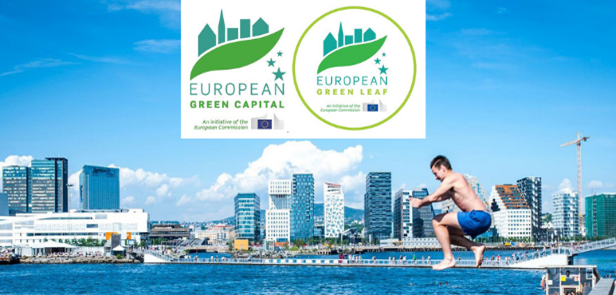
Ezine No. 30 - May 2019apital 2022 and European Green Leaf Awards 2021 competitions are now open! If you think your city can be an EU Ambassador, showcasing best practice in sustainable urban development to motivate and inspire other cities, then you should apply!
The European Green Capital Award (EGCA) is awarded annually to a European city with over 100,000 inhabitants that has shown itself to be a leader in environmental, social and economic sustainability. The winner of the 2022 Award will receive €350,000¹ to kick-start its year as a European Green Capital.
The European Green Leaf Award (EGLA) is open to towns and cities with between 20,000 and up to 100,000 inhabitants, to recognise and promote their efforts towards better environmental management and outcomes. The winner of the 2021 Award will receive €75,000¹ to support its activities throughout its European Green Leaf year.
If your city is interested in applying, you will first need to register your interest hereand then you will have access to the full set of application forms. Registration is completely obligation free and does not require you to submit an application at a later date; allowing your city to explore the application process and determine whether you would like to make a formal entry.
The deadline to submit your applications for both the 2022 European Green Capital and 2021 European Green Leaf competitions is 14 October 2019 at 23:59 CEST (GMT +2).
A message from EU Environment Commissioner Karmenu Vella, “There are many ways and paths to becoming a modern green city and I encourage all cities to apply for the European Green Capital and European Green Leaf Awards as a first step to a more sustainable future.”
[1] Subject to the approval of the EU 2020 Budget and approval by the College of the 2020 Financing Decision for the EU Life Programme
Join us at this year’s EGCA 2022 Applicant Workshop!
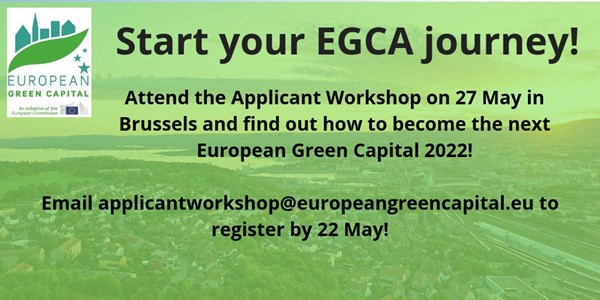
For eligible cities interested in applying for the European Green Capital (EGCA) 2022 competition, the European Commission is hosting a one-day Applicant Workshop in Brussels on 27 May! Deadline to register is fast approaching – on the 22nd of May – so hurry up and register today! You won’t want to miss this great opportunity!
This one-day workshop will give any interested city a comprehensive overview of what’s involved in putting together a successful application for the European Green Capital 2022 competition. The competition is now open and we will be accepting applications until 14 October at 23:59 CEST (GMT +2). Register and download the applications and bring your questions to the Applicant Workshop!
You will hear insights from:
- The European Commission on the benefits of applying
- Expert panel members with tips and advice on what makes a quality application
- European Green Capital 2020 winner Lisbon on what makes a winning bid
- The European Green Capital Secretariat on the competition process and key elements to consider should you make it to the finalist jury round
The European Commission’s Director General for Environment, Daniel Calleja, will personally close the workshop before we move together to the ‘world café cocktail’ where you can get even more information and tips in a hands-on and informal way.
If you would like to attend, please email applicantworkshop@europeangreencapital.eu to register by the 22nd of May. The programme and more information can be found here.
Finalist cities announced for 2021 EGCA & 2020 EGLA!
Lahti (Finland), Lille (France) and Strasbourg (France) have been announced as the finalists for the title of European Green Capital 2021.
For the European Green Leaf 2020 contest, the cities of Lappeenranta (Finland), Limerick (Ireland) and Mechelen (Belgium) have been shortlisted.
We would like to congratulate all six green cities and wish them the best of luck with the final stage of the competition!


What happens next?
Now, the finalists are busy preparing for the final stage of the competitions, where they must present their cities to an international Jury, demonstrating their overall commitment to sustainable urban development and their capacity to act as an ‘ambassador for change’ by showing other cities what a green city is and why this is necessary. At the same time, finalist cities need to present their strategy for engaging with their local stakeholders and citizens.
This year’s winners will be announced at the official Awards Ceremony on 20 June 2019 in Oslo, the 2019 European Green Capital. Why don’t you join and watch the announcement of the winners on our live web stream here: www.oslo2019.live.
The European Commission’s ‘Great Food from European Green Cities’ recipe book wins prestigious Gourmand Award!
In the December 2018 issue of the Ezine, the Secretariat informed readers about the European Green Capital and European Green Leaf Network recipe book that was released last year. The one-of-a-kind recipe book brings together sustainable food practices, initiatives and recipes from 21 cities from both the European Green Capital Network and European Green Leaf Network.
The Secretariat is pleased to announce that this unique food and travel book was awarded with the prestigious Gourmand Award 2019, which honours the best food and wine books across the globe!
Urban food production and consumption has a major impact on the environment. In the EU, a staggering 88 million tonnes of food are wasted, costing an estimated €143 billion, and causing an enormous and unnecessary burden on our environment. And citizens are also concerned. According to a recent Eurobarometer survey on attitudes of European citizens towards the environment, 50% of respondents say their city, town or village is not doing enough to protect the environment, while the growing amount of waste is the third most important environmental issue to European citizens.
By showing how the European Green Capital and European Green Leaf Network cities are addressing sustainable food challenges, this book shares ideas and solutions, encouraging people to change their behaviour.
At the end of April, a campaign to promote this book and the various types of environmentally-friendly food practices these cities are implementing was launched. Join the conversation by using and following the hashtag #Recipes4GreenCities on social media to find out more about these green cities’ projects and recipes. We also encourage everyone to share their sustainable initiatives to combat food waste as well as photos of the recipes tried from the book.
Click here to read “Great Food from European Green Cities”.
To order your very own copy, click here.
Any city can become future-proof!
This is the underlying message from the European Green Capital Network in its Future-proof Toolkit, launched on 6 May 2019, which includes case studies, guidance and insider tips on how cities can increase their resilience towards climate change. This is the first in a series of five toolkits from the Network, supporting cities to become more sustainable.
The case studies covered in the Toolkit showcase Oslo’s storm-water management strategy, Nijmegen’s citizen-led approach to reducing flood risk, Hamburg’s plans to build 100 hectares of green roofs, and Lisbon’s green infrastructure programme. Not only do the case studies highlight the ideas, approaches taken and achievements, but they also present the challenges faced. As current and former winners and finalists of the European Green Capital Award, the Network’s members are open about the fact that even they face obstacles and are still learning, and that by working together and sharing insights, cities can move forward.
In addition to the case studies, the Toolkit provides links to useful tools, videos, information sources and advice on broader topics such as inequality and uncertainty. Key themes throughout include the potential of nature-based solutions, embracing the expertise of local citizens, and recognising that green transformation is not only about making cities resilient towards climate change, but it is also about the social; about working together with locals to provide access to nature that all communities can enjoy.
As an example, the aim of Lisbon’s green corridors and planting its 80,000 new trees was not only to reduce air pollution and vulnerability towards heat waves; it was also about becoming more socially inclusive by improving public access to nature, enabling more people to cycle to work and involving citizens via initiatives such as Lisbon’s tree-planting Saturdays. “With green infrastructure, there is a wide range of challenges you can address through the same solution,” explains Duarte Mata of the City of Lisbon.
To accompany the launch of the Future-proof Toolkit, the Network is hosting a webinar on 12 June at 14.00 CET. Any cities or other interested parties are very welcome to join in to learn more about future-proofing your cities. Register here to participate.
For more information and questions, please contact the Network: network@europeangreencapital.eu
Latest news from our current EGCA & EGLA cities!
Oslo, European Green Capital 2019
New climate initiative for schools in Oslo: knowledge is power
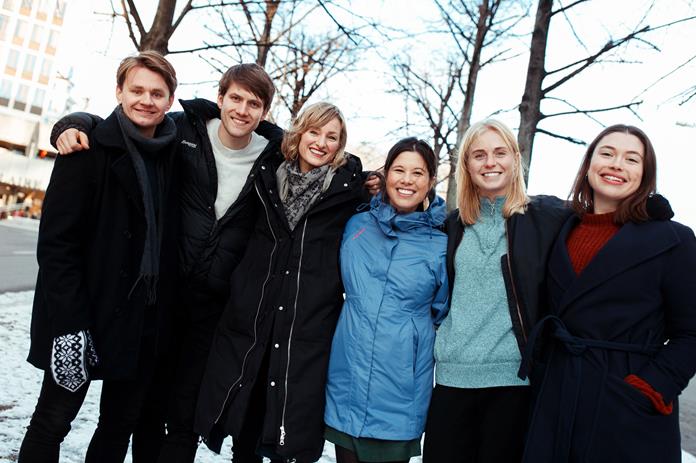
The four Climate Pilots, Ole Erik Lunder, Hauk Are Fjeld, Ingrid Holtan Søbstad and Emilie Vereide, with the Vice Mayor for Cultural Affairs and Education, Inga Marte Thorkildsen, and the Vice Mayor for Environment and Transport, Lan Marie Berg. (Photo: Oda Hveem)
In recent times, Norway has sometimes been criticized for being inefficient in the way schools are teaching children about climate and the environment. This is something the City of Oslo is aiming to remedy in 2019 through one of the major initiatives being rolled out during their European Green Capital year, which focuses on education and schools.
The Climate Agency and the Education Agency have joined forces to provide school children with updated quality knowledge, delivered in a new, cool and innovative way.
The two Agencies created a Climate Project with two main ingredients: ‘Climate Pilots’ – which includes young and highly skilled lecturers – and a web-based education portal, providing a user-friendly overview of climate and environment-related educational resources for all primary and secondary schools. It is a one-stop-shop with all the resources teachers need to provide updated knowledge.
The four ‘Climate Pilots’ are all master’s students, and currently touring the schools of Oslo with their one-hour long lecture. The feedback from teachers and students has been amazing. This Climate Project will be one of the lasting initiatives spurred by Oslo being awarded the title European Green Capital 2019.
European Green Leaf 2019, Cornellà de Llobregat!
Cornellà’s River Fest
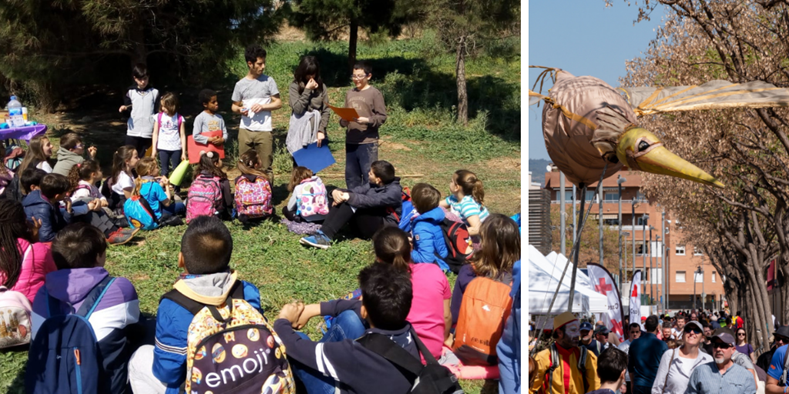
Cornellà de Llobregat organised its 6th ever River Fest at the end of March to commemorate World Water Day. They celebrated by organising two different events to engage with schools and citizens: on the 22nd of March, Cornellà hosted an event for Green Primary and Secondary schools and on the 24th of March, they put on a citizens’ fest to engage with local citizens in Cornellà.
Over 350 students across 3 secondary and 5 primary schools participated in the first event. Students had a full day of environmental activities, including tree planting and inspecting the Llobregat River ecosystem, Cornellà de Llobregat’s main river. As a result of the day’s festivities, the student River Fest event gained the collective commitment from students to preserve and improve the Llobergat River’s ecosystem.
The second event brought over 2,000 citizens together to take part in a host of activities too; ranging from a bicycle ride and a guided visit of the Llobregat River, to upcycling games and visiting the Cornellà Natura Exhibition. There was also a total of 14 environmental educational activities to learn about the Llobregat River’s ecosystem of insects, birds, reptiles and plants.
Cornellà’s Wins National Sustainability Award!

In other exciting news, Cornellà was awarded the National Sustainable City Award in the Environmental Education category for their project “Schools and Environment: 10 years of networking within Cornellà’s green schools”.
This Award recognises the huge work that primary and secondary schools in Cornellá have been doing in the last ten years to actively improve Cornellà’s urban and natural environment.
Key programmes that were highlighted as the reason for Cornellà winning this Award were programmes like the above River Fest; the co-creation of environmental educational resources amongst teachers; installing and monitoring birds’ nests in parks; and the various special waste collection points in schools to collect oil or small batteries. Well done to Cornellà and its local primary and secondary schools for being green!
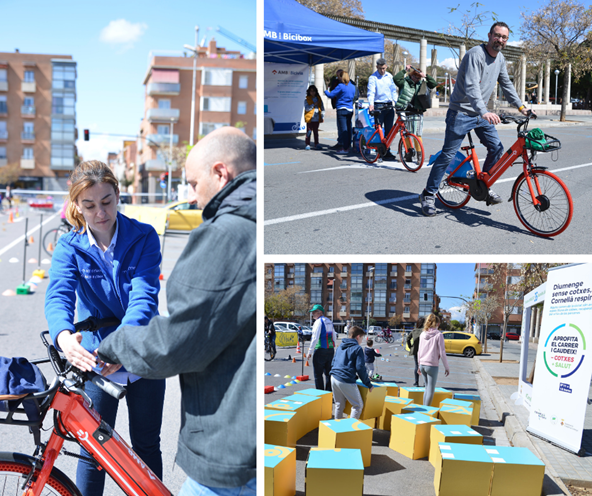
Cornellà’s Bicycle Month
April was bicycle month in Cornellá! Over the last month, Cornellà participated in the International Campaign “30 days of biking”. This brought together businesses, local organisations and schools to pledge to use bicycles every day in April to promote sustainable and healthy mobility.
The city combined the challenge with several educational activities to encourage everyone to get involved. They announced “Sundays without cars” for the month of April; introduced a bike track to improve citizen’s bike-handling; held an ‘E-Bicibox’ workshop to inform citizens of the new electric bike public service; and held a family cycling route from Cornellà to another city within the Barcelona Metropolitan Area, to name a few of the month’s activities.
European Green Leaf 2019, Horst aan de Maas
April was a very busy month for European Green Leaf 2019, Horst aan de Maas!
On the 4th of April, the municipality of Horst aan de Maas organised a “Walk to Work Day”. As walking increases creativity and productivity while also reducing stress and CO₂ emissions, the European Green Leaf encouraged everyone who worked at the municipality to walk to work!
In the middle of the month, as part of a Dutch campaign, Horst aan de Maas also organised a local National Bee Counting Weekend from the 14th to 15th of April. Eighty percent of all crops depend on pollination by bees and other insects, which means bees are vital for food production. One of the greatest threats to bees is a lack of food and nesting opportunities, which is what the National Bee Counting Weekend was trying to address by providing more food and nesting opportunities for bees. The European Green Leaf called on all local citizens to count the number of bees within their gardens.
Shortly after, Horst aan de Maas also organised a local Sports Week in collaboration with the municipality and citizens, with a special focus on promoting E-bikes on the 15th and 16th of April. Sports consultants organised an E-bike tour for the elderly over those two days in order to educate and inform the older citizens of Horst aan de Maas about how to use E-bikes safely.
The municipality also received visits from special delegations in April. A delegation from Sweden visited the municipality to find out more about Horst aan de Maas's waste-separation system and the EGLA 2019 team gave a presentation about their EGLA year. A Czech delegation from rural municipalities in the HANA region also visited Horst aan de Maas after making a pit stop at European Green Capital 2018, Nijmegen. Horst aan de Maas shared their experience on how to shape and share public and green spaces in a more rural context. It’s great to see Horst aan de Maas so busy and exchanging best practices and ideas!
5th European Green Leaf Network Meeting in Leuven
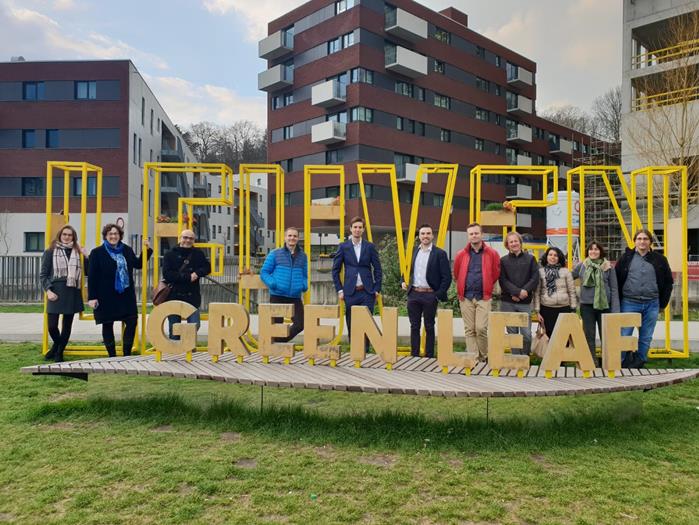
Leuven, joint European Green Leaf 2018 winner, hosted the 5th European Green Leaf Network (EGLN) meeting from the 26th to the 27th of March. The Network is made up of both winning and finalist cities of the European Green Leaf Award and aims to provide its members with the opportunity to collaborate, exchange experiences and ideas with colleagues from other administrations, who have a similarly high level of ambition and commitment to the environment.
Representatives from EGLN members in Cornellà de Llobregat (Spain), Horst aan de Maas (Netherlands), Leuven (Belgium), Mechelen (Belgium), Mollet del Vallès (Spain), Torres Vedras (Portugal) and Växjö (Sweden), as well as representatives from the EU Commission, the EGLA Secretariat and invited guest speakers, all attended the meeting.
The theme of the two-day meeting was energy with sustainable urban development. EGLN Members gave several presentations on their sustainable action plans, their energy transition to more sustainable methods, the challenges they have faced in their energy sector and how they have actively involved their citizens within energy projects.
The meeting also took Network members on a guided walking tour of Leuven where they were shown how environmental and sustainable focused policies, such as the removal of cars from the city centre, the increased installation of green infrastructure and the redevelopment of areas to include sustainable energy buildings, have had a positive impact on the city’s environment and population.
We are looking forward to the next meeting in September 2019 in Växjö, Sweden, joint EGLA 2018 winner!
Key dates for your calendar!
There are many events coming up over the next few months. Be sure to pencil them into your calendar to make sure you don’t miss out!
- 14 May: Call for Applications for EGCA 2022 & EGLA 2021 competitions now open! Register your city here to get the full set of application forms.
- 22-24 May: Urban Future Global Conference in Oslo – EGCA Session on 22 May @ 11-12 pm
- 27 May: EGCA 2022 Applicant Workshop & ‘World Café’ cocktail in Brussels (at European Commission’s DG Environment premises). Deadline to register 22 May.
- 20 June: EGCA 2021 & EGLA 2020 Awards Ceremony in Oslo. Watch the Awards Ceremony live here.
- 25 June: ICLEI’s European Urban Resilience Forum in Bonn
- 14 October at 23:59 CEST (GMT +2): Closing date of EGCA 2022 & EGLA 2021 competitions




























































